外研版(2019)选择性必修 第二册Unit 6 Survival Developing ideas &Presenting ideas & Reflection课件(共38张PPT)
文档属性
| 名称 | 外研版(2019)选择性必修 第二册Unit 6 Survival Developing ideas &Presenting ideas & Reflection课件(共38张PPT) | 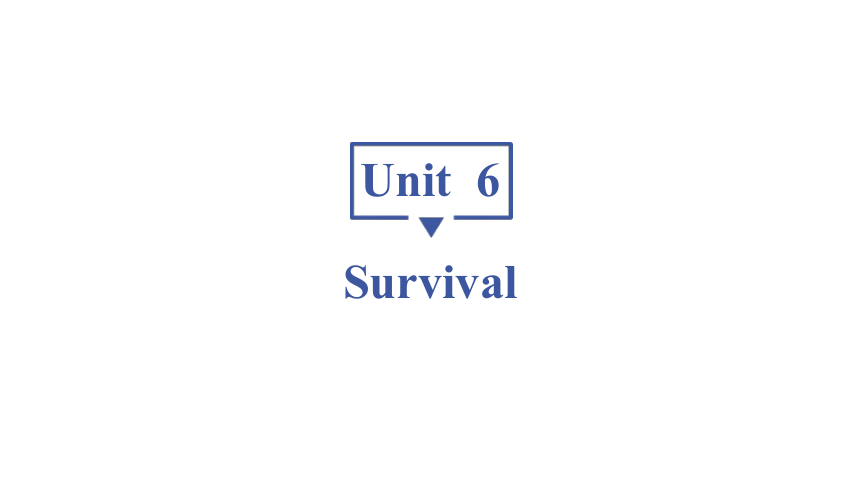 | |
| 格式 | pptx | ||
| 文件大小 | 1.2MB | ||
| 资源类型 | 教案 | ||
| 版本资源 | 外研版(2019) | ||
| 科目 | 英语 | ||
| 更新时间 | 2023-05-08 21:52:48 | ||
图片预览

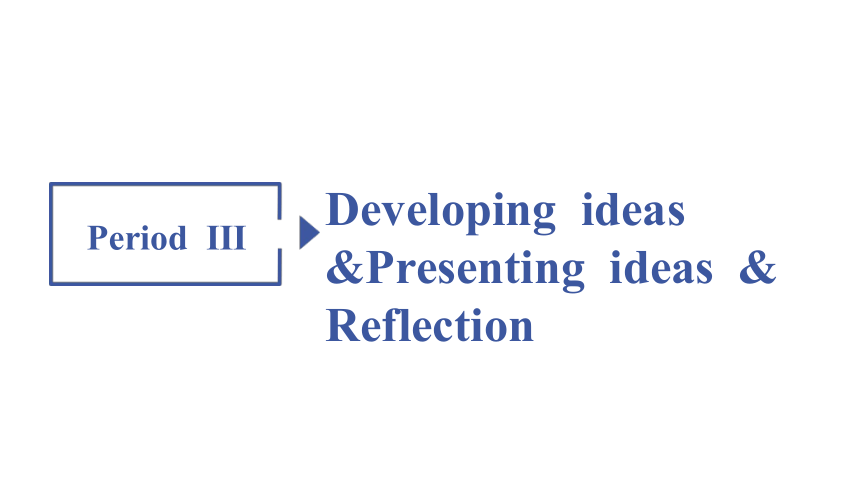
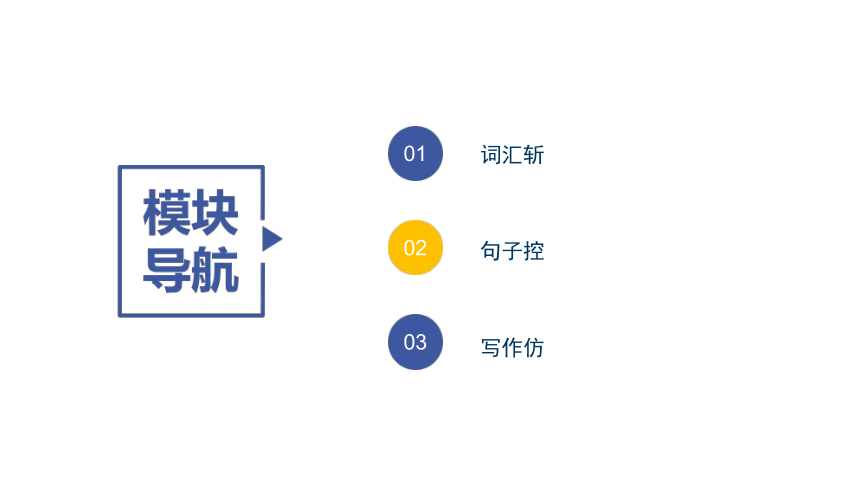
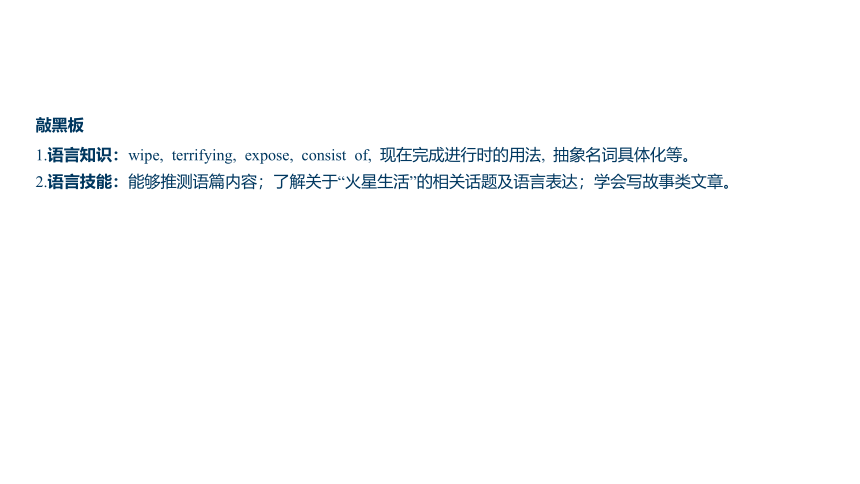
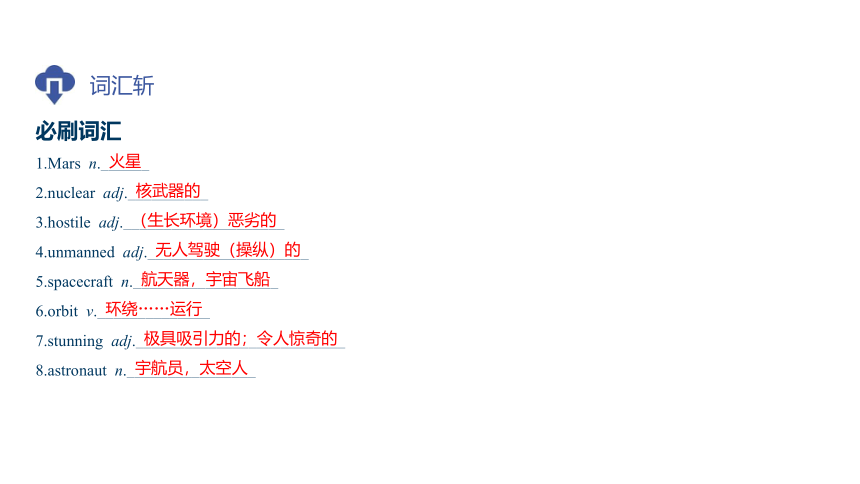
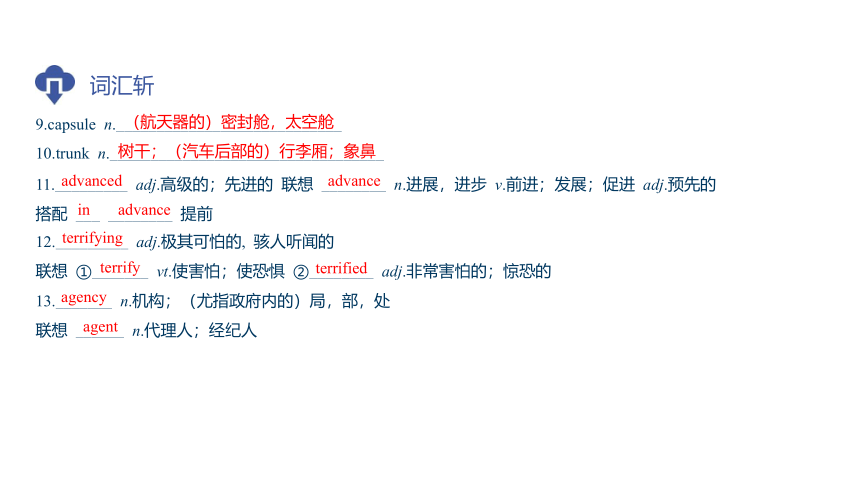
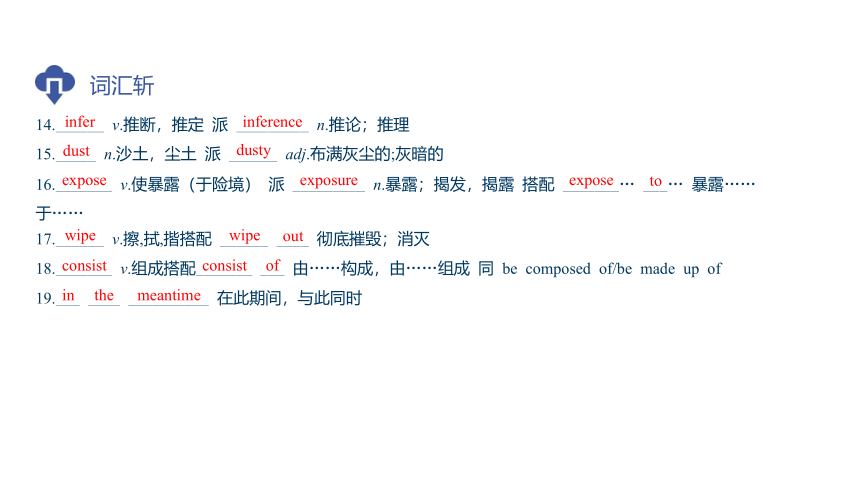
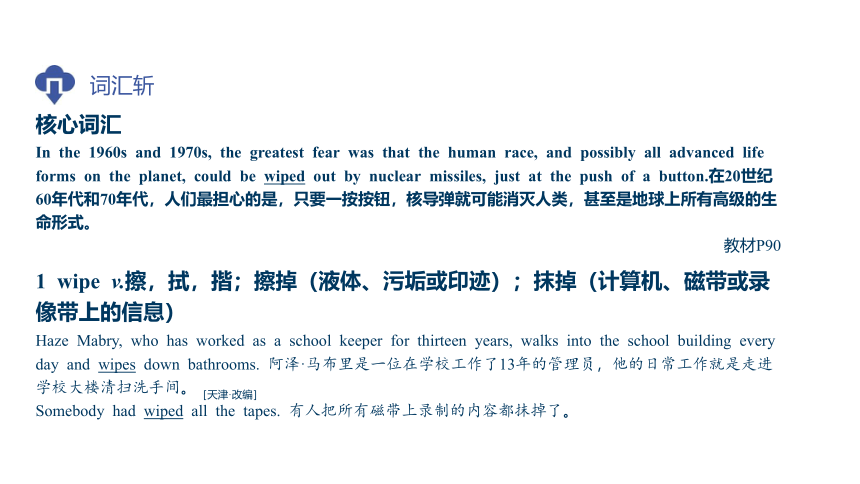
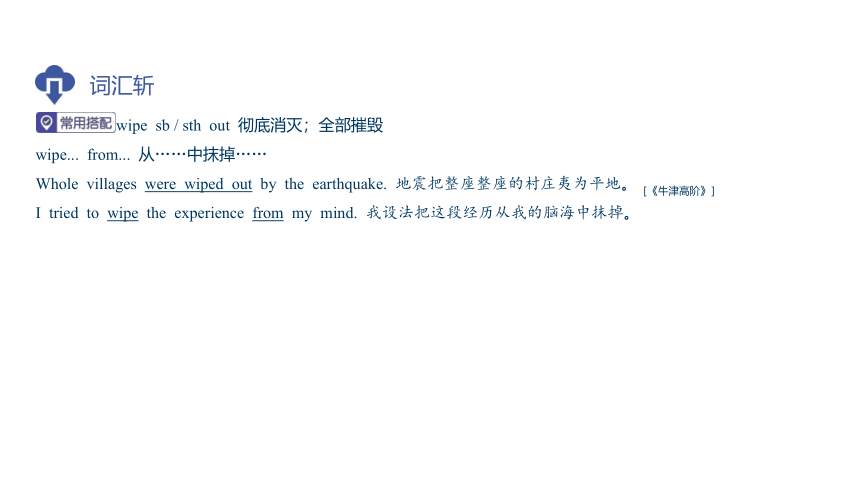
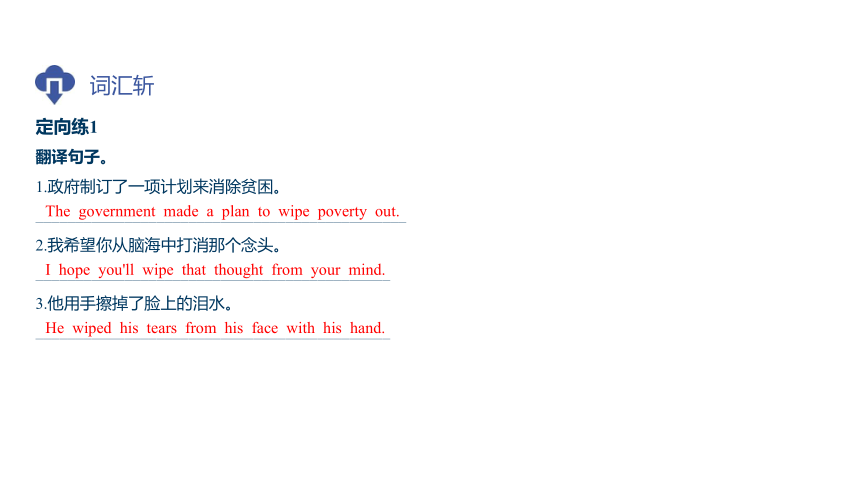
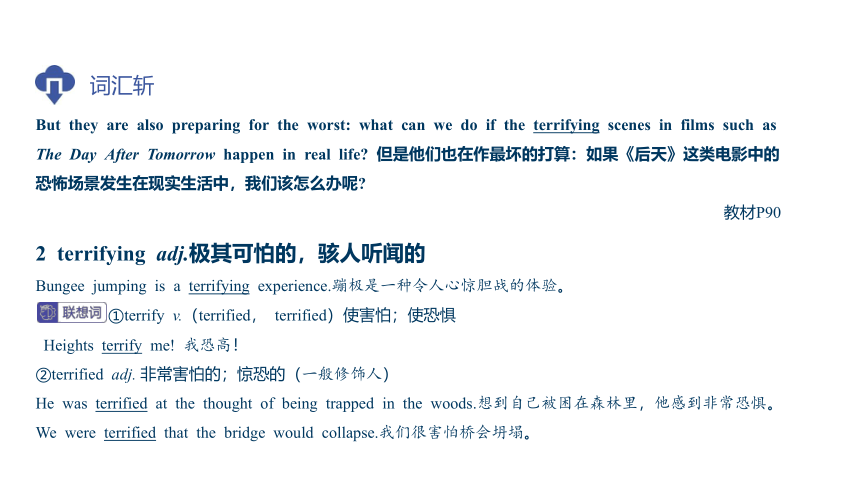

文档简介
(共38张PPT)
Unit 6
Survival
Period Ⅲ
Developing ideas &Presenting ideas & Reflection
敲黑板
1.语言知识:wipe, terrifying, expose, consist of, 现在完成进行时的用法, 抽象名词具体化等。
2.语言技能:能够推测语篇内容;了解关于“火星生活”的相关话题及语言表达;学会写故事类文章。
必刷词汇
1.Mars n.______
火星
2.nuclear adj.__________
核武器的
3.hostile adj.____________________
(生长环境)恶劣的
4.unmanned adj.____________________
无人驾驶(操纵)的
5.spacecraft n.__________________
航天器,宇宙飞船
6.orbit v.______________
环绕……运行
7.stunning adj.__________________________
极具吸引力的;令人惊奇的
8.astronaut n.________________
宇航员,太空人
9.capsule n.____________________________
(航天器的)密封舱,太空舱
10.trunk n.__________________________________
树干;(汽车后部的)行李厢;象鼻
11._________ adj.高级的;先进的 联想 ________ n.进展,进步 v.前进;发展;促进 adj.预先的
搭配 ___ ________ 提前
advanced
advance
in
advance
12._________ adj.极其可怕的, 骇人听闻的
联想 ①_______ vt.使害怕;使恐惧 ②________ adj.非常害怕的;惊恐的
terrifying
terrify
terrified
13._______ n.机构;(尤指政府内的)局,部,处
联想 ______ n.代理人;经纪人
agency
agent
14.______ v.推断,推定 派 _________ n.推论;推理
infer
inference
15._____ n.沙土,尘土 派 ______ adj.布满灰尘的;灰暗的
dust
dusty
16._______ v.使暴露(于险境) 派 _________ n.暴露;揭发,揭露 搭配 _______… ___… 暴露……
于……
expose
exposure
expose
to
17.______ v.擦,拭,揩搭配 ______ ____ 彻底摧毁;消灭
wipe
wipe
out
18._______ v.组成搭配_______ ___ 由……构成,由……组成 同 be composed of/be made up of
consist
consist
of
19.___ ____ __________ 在此期间,与此同时
in
the
meantime
核心词汇
In the 1960s and 1970s, the greatest fear was that the human race, and possibly all advanced life forms on the planet, could be wiped out by nuclear missiles, just at the push of a button.在20世纪60年代和70年代,人们最担心的是,只要一按按钮,核导弹就可能消灭人类,甚至是地球上所有高级的生命形式。
教材P90
1 wipe v.擦,拭,揩;擦掉(液体、污垢或印迹);抹掉(计算机、磁带或录像带上的信息)
Haze Mabry, who has worked as a school keeper for thirteen years, walks into the school building every day and wipes down bathrooms. 阿泽·马布里是一位在学校工作了13年的管理员,他的日常工作就是走进学校大楼清扫洗手间。[天津·改编]
Somebody had wiped all the tapes. 有人把所有磁带上录制的内容都抹掉了。
&1& wipe sb / sth out 彻底消灭;全部摧毁
wipe... from... 从……中抹掉……
Whole villages were wiped out by the earthquake. 地震把整座整座的村庄夷为平地。[《牛津高阶》]
I tried to wipe the experience from my mind. 我设法把这段经历从我的脑海中抹掉。
定向练1
翻译句子。
1.政府制订了一项计划来消除贫困。
______________________________________________
The government made a plan to wipe poverty out.
2.我希望你从脑海中打消那个念头。
____________________________________________
I hope you'll wipe that thought from your mind.
3.他用手擦掉了脸上的泪水。
____________________________________________
He wiped his tears from his face with his hand.
But they are also preparing for the worst: what can we do if the terrifying scenes in films such as The Day After Tomorrow happen in real life 但是他们也在作最坏的打算:如果《后天》这类电影中的恐怖场景发生在现实生活中,我们该怎么办呢
教材P90
2 terrifying adj.极其可怕的,骇人听闻的
Bungee jumping is a terrifying experience.蹦极是一种令人心惊胆战的体验。
&2& ①terrify v.(terrified, terrified)使害怕;使恐惧
Heights terrify me! 我恐高!
②terrified adj. 非常害怕的;惊恐的(一般修饰人)
He was terrified at the thought of being trapped in the woods.想到自己被困在森林里,他感到非常恐惧。
We were terrified that the bridge would collapse.我们很害怕桥会坍塌。
特别注意
一般情况下,-ed形式的形容词修饰人,-ing形式的形容词修饰事物。但当被修饰词是look(脸色), face(表情), expression(神情),voice(声音)等表示人的情绪状态的名词时,也需用-ed形式的形容词来修饰。
定向练2
在空白处填入括号内单词的正确形式。
1.He heard the _________ (terrify) screams from the room.
terrifying
[解析] 句意为:他听到从房间里传来的可怕的尖叫声。用形容词terrifying修饰事物。
2.I'm ________ (terrify) of snakes.
terrified
[解析] 句意为:我很怕蛇。terrified意为“非常害怕的”,一般修饰人。
3.But just a few hundred years ago, crossing the ocean was a_________ (terrify) venture.
terrifying
[解析] 句意为:但就在几百年前,穿越大洋还是一场令人恐惧的冒险。
It consisted of a closed space in which people, animals and plants could live together.它由一个封闭的空间组成,人、动物和植物可以在其中共存。
教材P92
3 consist of 由……构成,由……组成(无被动,无进行时)
Their lives consist of the humdrum activities of everyday existence.他们的生活由日常单调的活动构成。
&3& consist in 在于;存在于(不用于进行时)
Success consists in the ability to continue efforts through failures.成功在于能够百折不挠。
&4& ①consistent adj.一致的;一贯的;符合的;持续的
be consistent with... 与……一致
This report is consistent with what we know.这个报道与我们所了解的情况是一致的。
②consistently adv. 始终如一地;一贯地
定向练3
在空白处填入1个适当的单词或括号内单词的正确形式。
1.The last five years have seen a __________ (consist) improvement in the country's economy.
consistent
2.The goods mainly consisted ___ food and medicines.
of
3.The attraction of the city consists ___ its combination of modern atmosphere and ancient style.
in
4.This statement is not consistent _____ what you said earlier.
with
...we can infer that the Moon is less exposed to dangerous radiation than Mars. ……我们可以推断月球受到的危险辐射比火星少。
教材P93
4 expose vt.使暴露(于险境);显露;使接触;使遭受;揭露
At low tide the sands are exposed.退潮时,沙滩就会显露出来。
&5& expose... to... 使……遭受……/暴露……于……
expose oneself to sth 使某人自己遭受某事
They are less exposed to stress caused by external factors. 他们较少遭受外部因素造成的压力。
Many newcomers are easily exposing themselves to life-threatening injury. 许多新手极易使自己受到危及生命的伤害。
&6& ①exposure n.暴露;接触,体验(常和 to 搭配)
Her exposure to museums enriched her life in France. 参观博物馆丰富了她在法国的生活。
②exposed adj. 无遮蔽的;无保护的;暴露的
All exposed skin should be covered with protective cream. 所有外露的皮肤都应该涂上防护霜。
定向练4
在空白处填入1个适当的单词或括号内单词的正确形式。
1.The impolite behaviour should ___________ (expose) to the public.
be exposed
[解析] 句意为:不文明的行为应该被公之于众。
2.It's harmful to expose your skin ___ the burning sun.
to
[解析] 句意为:把皮肤暴露于烈日下是有害的。
3.______________________ (expose) to foreign culture is helpful for you to learn a language.
Being exposed / Exposure
[解析] 句意为:接触外国文化对你学习语言有帮助。
1
【句意】自20世纪60年代以来,我们一直在向火星发射无人飞船。
教材 P91
&7& 现在完成进行时的用法
现在完成进行时的结构为“have / has+been+现在分词”,与现在完成时的区别在于,现在完成进行时强调动作的持续性和未完成性。其具体用法如下:
①表示从过去某时开始发生,一直延续到现在,并可能继续延续下去的动作。
I've been waiting for an hour but he still hasn't come. 我已经等了一个小时了,但他还没有来。
②表示动作刚刚结束。(有时还会指出动作的结果)
They have been talking about the book. 他们刚刚在讨论这本书。
③表示重复。(指断断续续,而非一直不停)
I have been bidding farewell to some friends today. 我今天同一些朋友告了别。
④表示过去的动作对现在的影响或造成的结果。(相当于现在完成时)
Who's been insulting you 谁冒犯你了?
定向练1
一、在空白处填入括号内单词的正确形式。
1.You know, I _________________ (look) for a job for three months, and this is my first formal interview.
have been looking
2.The little boy is dirty all over because he ________________ (play) in the mud all the morning.
has been playing
3.Here he is! We _________________ (wait) anxiously for him since two hours ago.
have been waiting
二、翻译句子。
1.你做这份工作多久了?
________________________________________
How long have you been doing this work?
2.我的衣服湿了,我一直在冒雨走路。
_____________________________________________
My clothes are wet.I've been walking in the rain.
3.他是不是一直在制造麻烦?
___________________________
Has he been making trouble
1
【句意】尽管这一为期两年的实验并不成功,但它确实让我们更好地理解了人类如何能够在另一个星球上生存。
教材 P92
&8& 抽象名词具体化
抽象名词具体化通常可分为以下几类:
①表示情感、情绪等的抽象名词,当用来强调具体的人或事时,常将其具体化使用。常用的这类抽象名词有:
抽象名词(不可数) 具体化名词(可数)
surprise吃惊;惊奇 a surprise令人吃惊的人或事
pleasure愉快;高兴 a pleasure一件乐事
honour荣誉;崇敬 an honour荣幸(常用单数);荣誉称号
pity 遗憾 a pity 一件遗憾的事
pride骄傲 a pride令人骄傲的人或事
comfort安慰;舒适 a comfort安慰者;慰藉物
danger危险 a danger可能引起危险的人或物;威胁
success成功 a success成功的人或事
failure失败 a failure失败的人或事
help 帮助 a help帮手,起帮助作用的人或物(常用单数)
beauty美;美丽 a beauty美人;美丽的东西
②表示“一次”“一场”“一段”等“一……”的概念时,常与动词连用构成短语,名词前常有形容词修饰。如: have a good time; have a good knowledge/understanding of; have a population of; have an income of; cover an area of; reach a height of等。
③与动词have, take, make, give等连用,表示某一次短暂的动作。如:have a swim / rest / look / trip / discussion / smoke / wash / sleep;take a walk / bath; give/take a try; make an advance/an early start/an apology; take / have a great interest; go out for a walk 等。
④用于接同源宾语的短语时,常将抽象名词具体化,如:live a happy / simple / hard / poor / bitter life; dream a strange dream; die a heroic death; breathe a deep breath等。
定向练2
翻译句子。
1.在这里见到你真是件意外的事!
______________________________
What a surprise to see you here!
2.和他一块儿工作是件乐事。
______________________________
It's a pleasure to work with him.
3.在这里发言是一种荣幸。
___________________________
It's an honour to speak here.
4.你考试不及格真是可惜。
______________________________________
It's a pity that you fail (in) the exam.
5.他是他父母的一个骄傲。
___________________________
He is a pride of his parents.
6.她努力使自己的孩子们过得舒适,这对于她来说是一件欣慰的事。
___________________________________________________________________
She tried to make her children live in comfort, which is a comfort to her.
7.作为科学家,他是个很成功的人。
_________________________________
He is a great success as a scientist.
8.他已经经历了六次失败,并将再次尝试。
_____________________________________________
He has had six failures and will have another try.
写作仿 写故事类文章
文体分析
1.文体介绍
故事类文章是记叙文的一种,文章的要素有时间、地点、人物、事件,事件又包括它的起因、经过和结果。我们通常用五个“W”(what, who, when, where, why) 和一个“H”(how)来表示这些要素。
2.篇章结构
第一部分:开头——交代时间、地点、人物等要素;
第二部分:正文——描述事件的发生、发展和高潮;
第三部分:结尾——阐述事件的结局或对此事的感受或看法。
素材储备
1.写作指导
(1)人称
故事可用第一人称来叙述, 也可用第三人称。用第一人称会令文章更生动、形象,给读者以身临其境的感觉。
(2)叙述的顺序
故事类文章应以叙事为主, 按照事件发生、发展的过程来写, 将事件的前因后果串联起来。叙事的顺序一般有顺叙和倒叙两种。顺叙多是按照事件发生、发展的先后顺序进行叙述, 一般以时间推移为线索, 在文章的开头就交代出事件发生的时间、地点和人物。而倒叙多以事件的结局作为文章的开端, 然后再按事件发生、发展的先后顺序进行叙述。
(3)对话的使用
叙述一件事,我们常常用间接引语,但是,如果能适当使用直接引语,则可以更直接地反映人物的性格、品质和心理状态,使文章内容更加生动、具体。
2.常用表达
Last week, our school held a... on the topic of... , attracting much attention. 上周我们学校举办了以……为主题的……,引起了极大的关注。
As scheduled / planned, we gathered together in / at... and headed for... by... 按预定时间/计划,我们在……集合并一同乘坐……前往……
be busy doing... 忙着做……
gather one's strength / courage to do... 鼓足力气/勇气做……
hold one's breath to steal int... 屏住呼吸悄悄溜进……
fight one's way 奋力前进
struggle one's way 艰难前进
cast a(n)... eye on... 向……投以……的目光
couldn't help doing... 忍不住做……
be devoted to... 全力投入……;致力于……
What a nice time / day we have! 多么美好的时刻/一天!
There is no doubt that... becomes a hit and has a far-reaching impact on... 毫无疑问……成为热门,并对……有深远影响。
句子仿写
1.今天,我们学校举办了一场中国诗词大赛。(被动语态)
___________________________________________________
Today, a Chinese poetry contest was held in our school.
2.这场比赛引起了极大关注。
_________________________________
The contest attracted much attention.
3.他鼓足勇气求助。
____________________________________________
He gathered (all) his courage to ask for help.
4.在场的所有人都向那个男孩投去赞赏的目光。
___________________________________________________
All the people present cast an admiring eye on the boy.
5.用非限制性定语从句合并句1和句2。
______________________________________________________________________________
Today, a Chinese poetry contest was held in our school, which attracted much attention.
6.用非谓语作结果状语合并句1和句2。
_________________________________________________________________________
Today, a Chinese poetry contest was held in our school, attracting much attention.
模拟演练
假定你是红星中学高三学生李华,请根据以下四幅图的先后顺序,写一篇英语短文,记述你们上周接待交换生并带领他们体验中国茶文化的全过程。
注意:词数不少于100。
___
【思路引导】
【参考范文】
Last week, a group of exchange students visited our school. To help them better understand our tea culture, I took them to the tea room in our school, where I introduced the history of tea-making and different kinds of tea to them.All the exchange students were quite interested in my introduction.
Then I showed them how to make tea. I sat at a table, explaining every step of the process while making tea.All of them were amazed. They couldn't wait to have a try for themselves.
Soon the tea room became lively with every exchange student trying to make their own tea. We had a lot of fun practising and enjoying the tea.
In the end, we took a group photo, with cups or tea in our hands, to record this unforgettable experience.
请总结你学到的有用表达:
【高级词汇】
_________________________________________________________________________________________
【高级句式】
__________________________________________________________________________________________
Unit 6
Survival
Period Ⅲ
Developing ideas &Presenting ideas & Reflection
敲黑板
1.语言知识:wipe, terrifying, expose, consist of, 现在完成进行时的用法, 抽象名词具体化等。
2.语言技能:能够推测语篇内容;了解关于“火星生活”的相关话题及语言表达;学会写故事类文章。
必刷词汇
1.Mars n.______
火星
2.nuclear adj.__________
核武器的
3.hostile adj.____________________
(生长环境)恶劣的
4.unmanned adj.____________________
无人驾驶(操纵)的
5.spacecraft n.__________________
航天器,宇宙飞船
6.orbit v.______________
环绕……运行
7.stunning adj.__________________________
极具吸引力的;令人惊奇的
8.astronaut n.________________
宇航员,太空人
9.capsule n.____________________________
(航天器的)密封舱,太空舱
10.trunk n.__________________________________
树干;(汽车后部的)行李厢;象鼻
11._________ adj.高级的;先进的 联想 ________ n.进展,进步 v.前进;发展;促进 adj.预先的
搭配 ___ ________ 提前
advanced
advance
in
advance
12._________ adj.极其可怕的, 骇人听闻的
联想 ①_______ vt.使害怕;使恐惧 ②________ adj.非常害怕的;惊恐的
terrifying
terrify
terrified
13._______ n.机构;(尤指政府内的)局,部,处
联想 ______ n.代理人;经纪人
agency
agent
14.______ v.推断,推定 派 _________ n.推论;推理
infer
inference
15._____ n.沙土,尘土 派 ______ adj.布满灰尘的;灰暗的
dust
dusty
16._______ v.使暴露(于险境) 派 _________ n.暴露;揭发,揭露 搭配 _______… ___… 暴露……
于……
expose
exposure
expose
to
17.______ v.擦,拭,揩搭配 ______ ____ 彻底摧毁;消灭
wipe
wipe
out
18._______ v.组成搭配_______ ___ 由……构成,由……组成 同 be composed of/be made up of
consist
consist
of
19.___ ____ __________ 在此期间,与此同时
in
the
meantime
核心词汇
In the 1960s and 1970s, the greatest fear was that the human race, and possibly all advanced life forms on the planet, could be wiped out by nuclear missiles, just at the push of a button.在20世纪60年代和70年代,人们最担心的是,只要一按按钮,核导弹就可能消灭人类,甚至是地球上所有高级的生命形式。
教材P90
1 wipe v.擦,拭,揩;擦掉(液体、污垢或印迹);抹掉(计算机、磁带或录像带上的信息)
Haze Mabry, who has worked as a school keeper for thirteen years, walks into the school building every day and wipes down bathrooms. 阿泽·马布里是一位在学校工作了13年的管理员,他的日常工作就是走进学校大楼清扫洗手间。[天津·改编]
Somebody had wiped all the tapes. 有人把所有磁带上录制的内容都抹掉了。
&1& wipe sb / sth out 彻底消灭;全部摧毁
wipe... from... 从……中抹掉……
Whole villages were wiped out by the earthquake. 地震把整座整座的村庄夷为平地。[《牛津高阶》]
I tried to wipe the experience from my mind. 我设法把这段经历从我的脑海中抹掉。
定向练1
翻译句子。
1.政府制订了一项计划来消除贫困。
______________________________________________
The government made a plan to wipe poverty out.
2.我希望你从脑海中打消那个念头。
____________________________________________
I hope you'll wipe that thought from your mind.
3.他用手擦掉了脸上的泪水。
____________________________________________
He wiped his tears from his face with his hand.
But they are also preparing for the worst: what can we do if the terrifying scenes in films such as The Day After Tomorrow happen in real life 但是他们也在作最坏的打算:如果《后天》这类电影中的恐怖场景发生在现实生活中,我们该怎么办呢
教材P90
2 terrifying adj.极其可怕的,骇人听闻的
Bungee jumping is a terrifying experience.蹦极是一种令人心惊胆战的体验。
&2& ①terrify v.(terrified, terrified)使害怕;使恐惧
Heights terrify me! 我恐高!
②terrified adj. 非常害怕的;惊恐的(一般修饰人)
He was terrified at the thought of being trapped in the woods.想到自己被困在森林里,他感到非常恐惧。
We were terrified that the bridge would collapse.我们很害怕桥会坍塌。
特别注意
一般情况下,-ed形式的形容词修饰人,-ing形式的形容词修饰事物。但当被修饰词是look(脸色), face(表情), expression(神情),voice(声音)等表示人的情绪状态的名词时,也需用-ed形式的形容词来修饰。
定向练2
在空白处填入括号内单词的正确形式。
1.He heard the _________ (terrify) screams from the room.
terrifying
[解析] 句意为:他听到从房间里传来的可怕的尖叫声。用形容词terrifying修饰事物。
2.I'm ________ (terrify) of snakes.
terrified
[解析] 句意为:我很怕蛇。terrified意为“非常害怕的”,一般修饰人。
3.But just a few hundred years ago, crossing the ocean was a_________ (terrify) venture.
terrifying
[解析] 句意为:但就在几百年前,穿越大洋还是一场令人恐惧的冒险。
It consisted of a closed space in which people, animals and plants could live together.它由一个封闭的空间组成,人、动物和植物可以在其中共存。
教材P92
3 consist of 由……构成,由……组成(无被动,无进行时)
Their lives consist of the humdrum activities of everyday existence.他们的生活由日常单调的活动构成。
&3& consist in 在于;存在于(不用于进行时)
Success consists in the ability to continue efforts through failures.成功在于能够百折不挠。
&4& ①consistent adj.一致的;一贯的;符合的;持续的
be consistent with... 与……一致
This report is consistent with what we know.这个报道与我们所了解的情况是一致的。
②consistently adv. 始终如一地;一贯地
定向练3
在空白处填入1个适当的单词或括号内单词的正确形式。
1.The last five years have seen a __________ (consist) improvement in the country's economy.
consistent
2.The goods mainly consisted ___ food and medicines.
of
3.The attraction of the city consists ___ its combination of modern atmosphere and ancient style.
in
4.This statement is not consistent _____ what you said earlier.
with
...we can infer that the Moon is less exposed to dangerous radiation than Mars. ……我们可以推断月球受到的危险辐射比火星少。
教材P93
4 expose vt.使暴露(于险境);显露;使接触;使遭受;揭露
At low tide the sands are exposed.退潮时,沙滩就会显露出来。
&5& expose... to... 使……遭受……/暴露……于……
expose oneself to sth 使某人自己遭受某事
They are less exposed to stress caused by external factors. 他们较少遭受外部因素造成的压力。
Many newcomers are easily exposing themselves to life-threatening injury. 许多新手极易使自己受到危及生命的伤害。
&6& ①exposure n.暴露;接触,体验(常和 to 搭配)
Her exposure to museums enriched her life in France. 参观博物馆丰富了她在法国的生活。
②exposed adj. 无遮蔽的;无保护的;暴露的
All exposed skin should be covered with protective cream. 所有外露的皮肤都应该涂上防护霜。
定向练4
在空白处填入1个适当的单词或括号内单词的正确形式。
1.The impolite behaviour should ___________ (expose) to the public.
be exposed
[解析] 句意为:不文明的行为应该被公之于众。
2.It's harmful to expose your skin ___ the burning sun.
to
[解析] 句意为:把皮肤暴露于烈日下是有害的。
3.______________________ (expose) to foreign culture is helpful for you to learn a language.
Being exposed / Exposure
[解析] 句意为:接触外国文化对你学习语言有帮助。
1
【句意】自20世纪60年代以来,我们一直在向火星发射无人飞船。
教材 P91
&7& 现在完成进行时的用法
现在完成进行时的结构为“have / has+been+现在分词”,与现在完成时的区别在于,现在完成进行时强调动作的持续性和未完成性。其具体用法如下:
①表示从过去某时开始发生,一直延续到现在,并可能继续延续下去的动作。
I've been waiting for an hour but he still hasn't come. 我已经等了一个小时了,但他还没有来。
②表示动作刚刚结束。(有时还会指出动作的结果)
They have been talking about the book. 他们刚刚在讨论这本书。
③表示重复。(指断断续续,而非一直不停)
I have been bidding farewell to some friends today. 我今天同一些朋友告了别。
④表示过去的动作对现在的影响或造成的结果。(相当于现在完成时)
Who's been insulting you 谁冒犯你了?
定向练1
一、在空白处填入括号内单词的正确形式。
1.You know, I _________________ (look) for a job for three months, and this is my first formal interview.
have been looking
2.The little boy is dirty all over because he ________________ (play) in the mud all the morning.
has been playing
3.Here he is! We _________________ (wait) anxiously for him since two hours ago.
have been waiting
二、翻译句子。
1.你做这份工作多久了?
________________________________________
How long have you been doing this work?
2.我的衣服湿了,我一直在冒雨走路。
_____________________________________________
My clothes are wet.I've been walking in the rain.
3.他是不是一直在制造麻烦?
___________________________
Has he been making trouble
1
【句意】尽管这一为期两年的实验并不成功,但它确实让我们更好地理解了人类如何能够在另一个星球上生存。
教材 P92
&8& 抽象名词具体化
抽象名词具体化通常可分为以下几类:
①表示情感、情绪等的抽象名词,当用来强调具体的人或事时,常将其具体化使用。常用的这类抽象名词有:
抽象名词(不可数) 具体化名词(可数)
surprise吃惊;惊奇 a surprise令人吃惊的人或事
pleasure愉快;高兴 a pleasure一件乐事
honour荣誉;崇敬 an honour荣幸(常用单数);荣誉称号
pity 遗憾 a pity 一件遗憾的事
pride骄傲 a pride令人骄傲的人或事
comfort安慰;舒适 a comfort安慰者;慰藉物
danger危险 a danger可能引起危险的人或物;威胁
success成功 a success成功的人或事
failure失败 a failure失败的人或事
help 帮助 a help帮手,起帮助作用的人或物(常用单数)
beauty美;美丽 a beauty美人;美丽的东西
②表示“一次”“一场”“一段”等“一……”的概念时,常与动词连用构成短语,名词前常有形容词修饰。如: have a good time; have a good knowledge/understanding of; have a population of; have an income of; cover an area of; reach a height of等。
③与动词have, take, make, give等连用,表示某一次短暂的动作。如:have a swim / rest / look / trip / discussion / smoke / wash / sleep;take a walk / bath; give/take a try; make an advance/an early start/an apology; take / have a great interest; go out for a walk 等。
④用于接同源宾语的短语时,常将抽象名词具体化,如:live a happy / simple / hard / poor / bitter life; dream a strange dream; die a heroic death; breathe a deep breath等。
定向练2
翻译句子。
1.在这里见到你真是件意外的事!
______________________________
What a surprise to see you here!
2.和他一块儿工作是件乐事。
______________________________
It's a pleasure to work with him.
3.在这里发言是一种荣幸。
___________________________
It's an honour to speak here.
4.你考试不及格真是可惜。
______________________________________
It's a pity that you fail (in) the exam.
5.他是他父母的一个骄傲。
___________________________
He is a pride of his parents.
6.她努力使自己的孩子们过得舒适,这对于她来说是一件欣慰的事。
___________________________________________________________________
She tried to make her children live in comfort, which is a comfort to her.
7.作为科学家,他是个很成功的人。
_________________________________
He is a great success as a scientist.
8.他已经经历了六次失败,并将再次尝试。
_____________________________________________
He has had six failures and will have another try.
写作仿 写故事类文章
文体分析
1.文体介绍
故事类文章是记叙文的一种,文章的要素有时间、地点、人物、事件,事件又包括它的起因、经过和结果。我们通常用五个“W”(what, who, when, where, why) 和一个“H”(how)来表示这些要素。
2.篇章结构
第一部分:开头——交代时间、地点、人物等要素;
第二部分:正文——描述事件的发生、发展和高潮;
第三部分:结尾——阐述事件的结局或对此事的感受或看法。
素材储备
1.写作指导
(1)人称
故事可用第一人称来叙述, 也可用第三人称。用第一人称会令文章更生动、形象,给读者以身临其境的感觉。
(2)叙述的顺序
故事类文章应以叙事为主, 按照事件发生、发展的过程来写, 将事件的前因后果串联起来。叙事的顺序一般有顺叙和倒叙两种。顺叙多是按照事件发生、发展的先后顺序进行叙述, 一般以时间推移为线索, 在文章的开头就交代出事件发生的时间、地点和人物。而倒叙多以事件的结局作为文章的开端, 然后再按事件发生、发展的先后顺序进行叙述。
(3)对话的使用
叙述一件事,我们常常用间接引语,但是,如果能适当使用直接引语,则可以更直接地反映人物的性格、品质和心理状态,使文章内容更加生动、具体。
2.常用表达
Last week, our school held a... on the topic of... , attracting much attention. 上周我们学校举办了以……为主题的……,引起了极大的关注。
As scheduled / planned, we gathered together in / at... and headed for... by... 按预定时间/计划,我们在……集合并一同乘坐……前往……
be busy doing... 忙着做……
gather one's strength / courage to do... 鼓足力气/勇气做……
hold one's breath to steal int... 屏住呼吸悄悄溜进……
fight one's way 奋力前进
struggle one's way 艰难前进
cast a(n)... eye on... 向……投以……的目光
couldn't help doing... 忍不住做……
be devoted to... 全力投入……;致力于……
What a nice time / day we have! 多么美好的时刻/一天!
There is no doubt that... becomes a hit and has a far-reaching impact on... 毫无疑问……成为热门,并对……有深远影响。
句子仿写
1.今天,我们学校举办了一场中国诗词大赛。(被动语态)
___________________________________________________
Today, a Chinese poetry contest was held in our school.
2.这场比赛引起了极大关注。
_________________________________
The contest attracted much attention.
3.他鼓足勇气求助。
____________________________________________
He gathered (all) his courage to ask for help.
4.在场的所有人都向那个男孩投去赞赏的目光。
___________________________________________________
All the people present cast an admiring eye on the boy.
5.用非限制性定语从句合并句1和句2。
______________________________________________________________________________
Today, a Chinese poetry contest was held in our school, which attracted much attention.
6.用非谓语作结果状语合并句1和句2。
_________________________________________________________________________
Today, a Chinese poetry contest was held in our school, attracting much attention.
模拟演练
假定你是红星中学高三学生李华,请根据以下四幅图的先后顺序,写一篇英语短文,记述你们上周接待交换生并带领他们体验中国茶文化的全过程。
注意:词数不少于100。
___
【思路引导】
【参考范文】
Last week, a group of exchange students visited our school. To help them better understand our tea culture, I took them to the tea room in our school, where I introduced the history of tea-making and different kinds of tea to them.All the exchange students were quite interested in my introduction.
Then I showed them how to make tea. I sat at a table, explaining every step of the process while making tea.All of them were amazed. They couldn't wait to have a try for themselves.
Soon the tea room became lively with every exchange student trying to make their own tea. We had a lot of fun practising and enjoying the tea.
In the end, we took a group photo, with cups or tea in our hands, to record this unforgettable experience.
请总结你学到的有用表达:
【高级词汇】
_________________________________________________________________________________________
【高级句式】
__________________________________________________________________________________________
